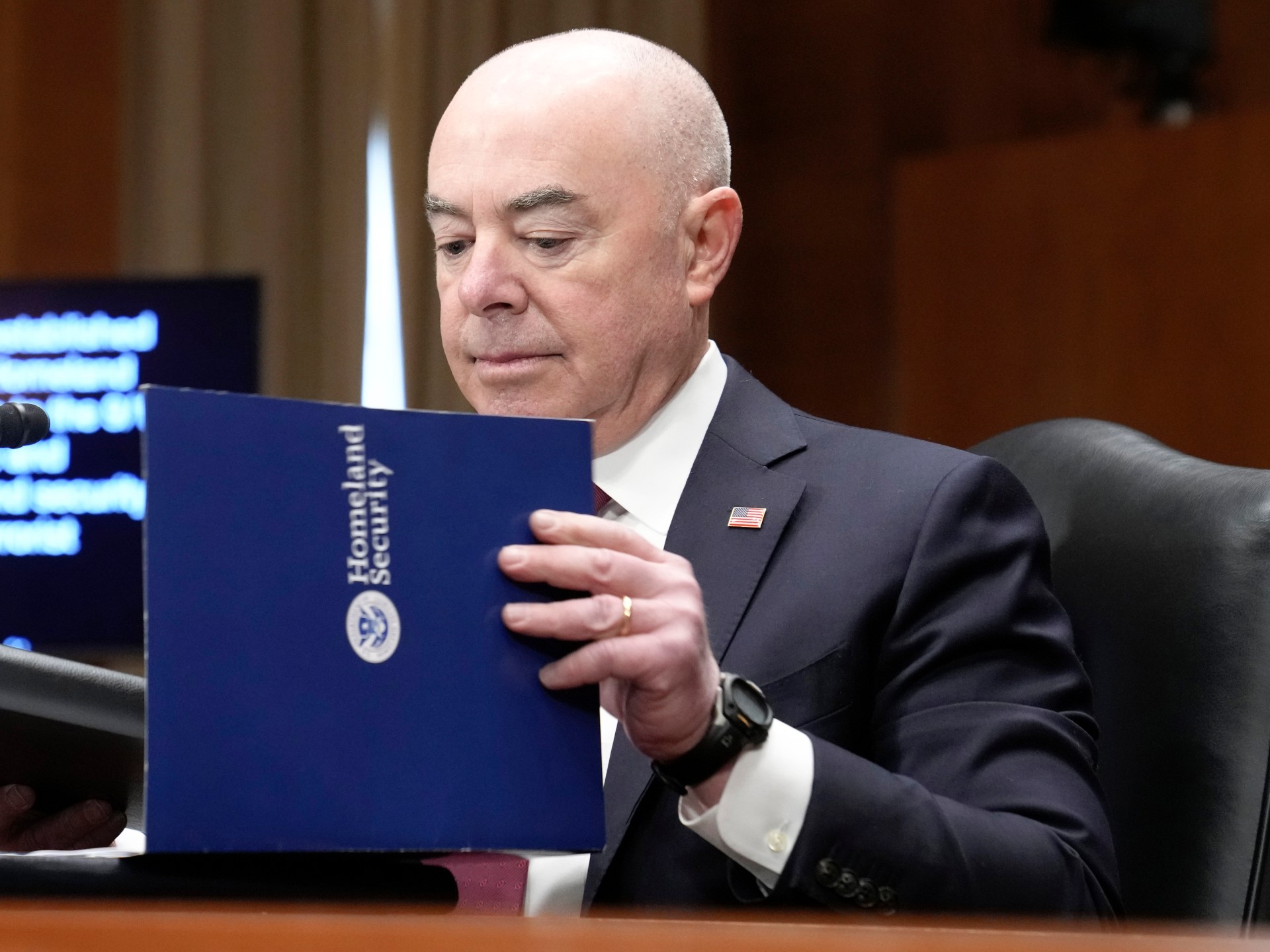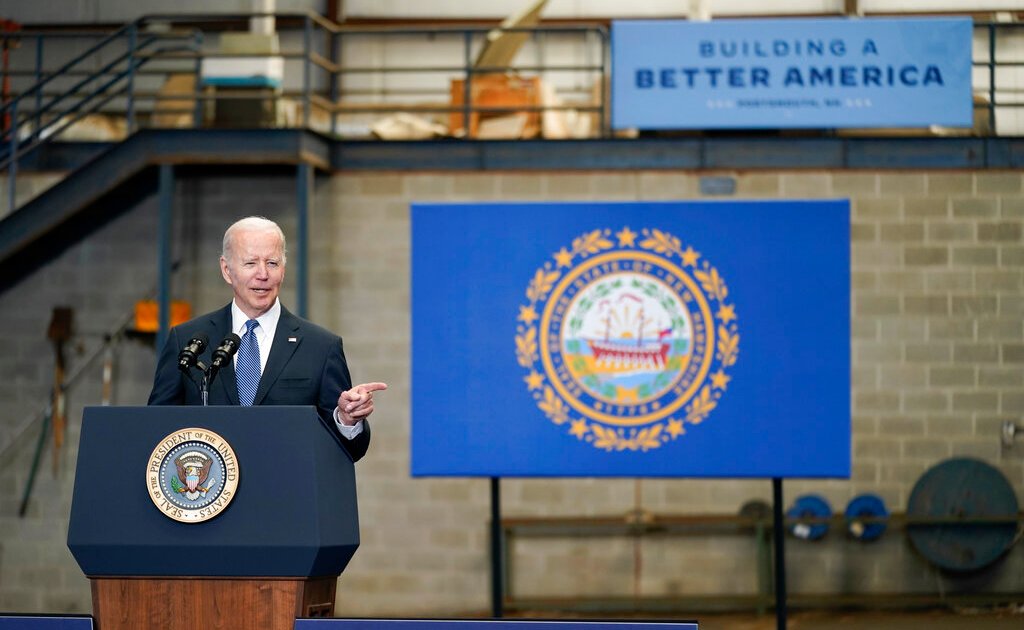Mayorkas lays out ‘evolved’ US security threats: What to know | Migration News
DHS head says migration, artificial intelligence, China, and climate change are top priorities for the 20-year-old department.
United States Homeland Security head Alejandro Mayorkas has laid out a vision for the department and how it will address “evolved” threats as it moves into its third decade of existence.
Migration, artificial intelligence, China, climate change and domestic extremism were among the top menaces facing the US in the years ahead, Mayorkas said on Friday in an address to the Council on Foreign Relations.
The Department of Homeland Security (DHS) was created in the wake of the September 11, 2001 attacks, absorbing into its purview an array of areas including “counterterrorism”, immigration and disaster response.
It has faced regular controversy, including requiring a “special registration” for Muslim men from certain countries in the early 2000s, and more recently, in 2020, surveilling Black Lives Matter protesters.
Still, Mayorkas sought to depict a department that was shifting “as the homeland security threat environment has evolved from a primarily focused counterterrorism posture to a complex and diverse landscape of challenges”.
He spoke a day after the department released its latest review on US homeland security, which it conducts every four years, a congressional requirement.
Here are some key takeaways:
Migration
- The model for the administration of US President Joe Biden is to “build lawful pathways to give individuals an opportunity to reach the United States safely, in an orderly way to avail themselves of the humanitarian relief our laws provide, and then deliver a consequence for those who do not avail themselves of those lawful pathways”, Myorkas said.
- He appeared to reference the Biden administration’s recent policy allowing the US to accept as many as 30,000 people per month from Nicaragua, Haiti, Cuba and Venezuela if they go through a specific immigration track while expelling anyone who seeks to irregularly cross the border. Rights groups have said the policy runs afoul of US law by denying people to claim asylum at the border.
- Mayorkas also said the Biden administration would be making a “decision in the coming days” on whether it would revive a controversial practice of detaining families who irregularly cross the border, a policy the administration had suspended upon taking office.
- Mayorkas denied that the approach of the Biden administration “drives a greater risk” of those seeking to cross the border to take more dangerous routes, as rights groups have alleged.
Artificial intelligence
- While countering threats in cyberspace remains one of the department’s top missions, Mayorkas focused heavily on the possibilities and threats of artificial intelligence.
- He also announced he was directing the creation of the department’s first AI task force, which “will drive specific applications of AI to advance our critical homeland security missions”.
- Examples listed included using AI to enhance supply chain integrity, screen cargo for products made through forced labour, and detect the shipment of fentanyl and chemicals used to make the drug, across the world.
- He said the department will ensure that their use of AI “is rigorously tested to avoid bias … and is clearly explainable to the people we serve”.
China
- While Mayorkas identified four “adverse nation states that are very focused on targeting” the US – China, Russia, Iran and North Korea, he gave Beijing particular emphasis, saying China’s government “poses an especially grave threat to the homeland, on that indeed does touch all of our department’s missions”.
- Those threats include China’s regional “aggressive presence”, as well as disruptive cyberattacks, and the possibility of Beijing’s “sponsored attacks designed to disrupt or degrade provision of national critical functions, sow discord, and panic and prevent mobilisation of US military capabilities”.
- Mayorkas said he had directed a “90-day department-wide sprint to assess how the threats posed by the PRC will evolve and how we can be best positioned to guard against future manifestations of this threat”.
Domestic extremism, drug trafficking and climate change
- Mayorkas said “lone offenders and small cells of individuals motivated by a wide range of grievances and violent extremist ideologies, from white supremacy to anti-Semitism to anti-government attitudes pose the most persistent and lethal terrorism-related threat in the United States”.
- Fentanyl trafficking has become a “scourge”, with 46,802 overdose deaths in 2018; 57,834 deaths in 2020; and 71,238 in 2021.
- The effects of climate change “have intensified”, resulting in longer wildfire seasons, and more frequent hurricanes and tornadoes, while globally increasing displacement.
Response to Republican barbs
- Mayorkas also addressed on Friday the heated questioning during a congressional hearing earlier in the week, which included several Republicans using their time solely to lodge accusations against him.
- In one exchange, Representative Marjorie Taylor Green called Mayorkas a “liar” after she accused him of failing to make efforts to address fentanyl trafficking across the border. In a rare move, the Republican chair of the committee ruled that Green’s comments violated House rules, which prevented her from speaking further during the hearing.
- On Friday, Mayorkas said of the comments: “I am fundamentally … impervious to them, because I may make some mistakes…my decisions may be mistaken, some may disagree with them, but I have 100 percent confidence in the integrity of my decision making.”




